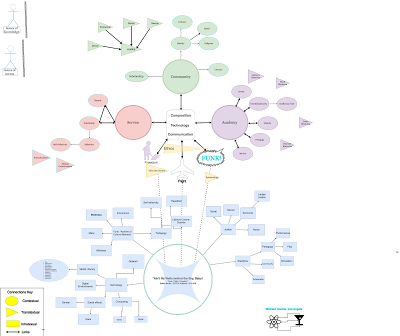We approached the task through the readings of our primary texts in order to find some footing in the theory. We then examined Banks’s text, picked out a section, and divided the task of analysis based on paragraphs. We looked at transtextual, contextual, and intratextual connections, working with our best understandings of these terms, to examine what Banks did in the text, what he did to reference culture in context, and what culture the audience brought to the text. We saw this text as exploring a space of productive cultural resistance where powers and epistemologies are able to communicate, network, take flight, and fight for freedom.
Looking at how Banks called for an expansion of the discipline of rhetoric and composition through funk, as a way of expanding access to the discourse, was a compelling method for cultivating intersections in theory, practice, and pedagogy. Banks’s call to action work to resist how “doctrine brings about a double subjugation: of the speaking subjects to discourses, and of discourses to the (at least virtual) group of speaking individuals” (Foucault 1469). Through the discourse analysis we found that Banks uses funk as a lens for “productive reading [which] attempts to provoke a response to the entire operation of dialectical argumentation” (Muckelbauer 92). These connections back to the discourse and reading the spaces were highlighted in our analysis. Banks, through multiple layers of context and culture, suggests that an inventive re-reading of the discipline of rhetoric and composition would allow for a shift in the discourse of academia.
This ability of discourse analysis to make invisible connections visible, to turn analyze them, and to examine them, is a powerful tool. Gates used it to great effect to show “what is meant by the materiality of the signifier, its thingness” (1562). We found that the analysis forced us to use multiple perspectives to examine how the text operated, materially, within a cultural context of the discipline of composition, academia, community, and service. We saw how Banks was able to argue for different identities as scholars and people inside and outside the university. There was a call to actions to account for and value different identities to change the nature of academic discourse. He illustrated how resistance, identification, and power were operating in funk, flight, and freedom in to argue for a more just discipline and society.
I’ve left this task feeling a bit overwhelmed, a bit lost, and that I’ve successfully struggled and played with the texts and theories. There is a breadth and a depth to identification/disidentification and culture that I feel I am just scratching the surface of. I know that I will return to Mucklebauer and Gates for future work, as their ideas on play, invention, and resistance will continue to inform my own interests.
Looking at how Banks called for an expansion of the discipline of rhetoric and composition through funk, as a way of expanding access to the discourse, was a compelling method for cultivating intersections in theory, practice, and pedagogy. Banks’s call to action work to resist how “doctrine brings about a double subjugation: of the speaking subjects to discourses, and of discourses to the (at least virtual) group of speaking individuals” (Foucault 1469). Through the discourse analysis we found that Banks uses funk as a lens for “productive reading [which] attempts to provoke a response to the entire operation of dialectical argumentation” (Muckelbauer 92). These connections back to the discourse and reading the spaces were highlighted in our analysis. Banks, through multiple layers of context and culture, suggests that an inventive re-reading of the discipline of rhetoric and composition would allow for a shift in the discourse of academia.
These theorists offered a depth of analysis of the relationships in and among culture, language, rhetoric, and discourse, that I feel I am just starting to approach. Doing the discourse analysis allowed us to start accounting for the multiple layers of power and culture that were presented, read, and explored through Banks. The task helped illustrate how many of the terms that we use—culture, ideology, pedagogy, and epistemology—are a part of a social system that “is at once controlled, selected, organized, and redistributed by a certain number of procedures whose role is to ward off its powers and dangers, to gain mastery over its chance events, to evade it ponderous, formidable materiality” (Foucault 1461). Discourse and language have a material reality and consequence that is often invisible.
 |
| Draft of our Visualization |
This ability of discourse analysis to make invisible connections visible, to turn analyze them, and to examine them, is a powerful tool. Gates used it to great effect to show “what is meant by the materiality of the signifier, its thingness” (1562). We found that the analysis forced us to use multiple perspectives to examine how the text operated, materially, within a cultural context of the discipline of composition, academia, community, and service. We saw how Banks was able to argue for different identities as scholars and people inside and outside the university. There was a call to actions to account for and value different identities to change the nature of academic discourse. He illustrated how resistance, identification, and power were operating in funk, flight, and freedom in to argue for a more just discipline and society.
I’ve left this task feeling a bit overwhelmed, a bit lost, and that I’ve successfully struggled and played with the texts and theories. There is a breadth and a depth to identification/disidentification and culture that I feel I am just scratching the surface of. I know that I will return to Mucklebauer and Gates for future work, as their ideas on play, invention, and resistance will continue to inform my own interests.
No comments:
Post a Comment